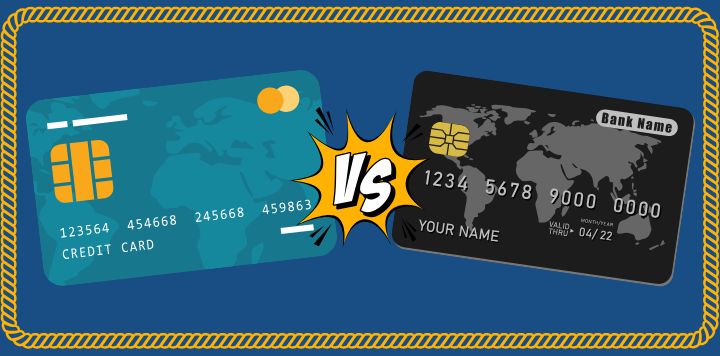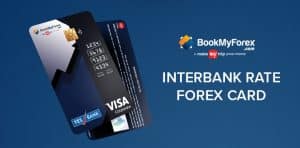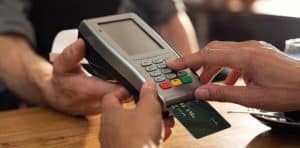Summary: Planning an international trip? Discover why a forex card is the best choice for managing your finances abroad in comparison to credit cards. Learn about fees, rates, security, and more to make an informed decision.
When planning an international trip, one of the crucial decisions you’ll need to make is how to manage your finances abroad. With various options available, it can be challenging to determine the best method for handling your expenses. Two popular choices are forex cards and credit cards, but which one is truly better for your travel needs? Read below to know the answer!
Comparison Between a Credit Card and a Forex Card
Let’s compare these two popular options in detail, examining their features, benefits, and potential drawbacks to help you make an informed decision for your next international trip.
Card Issuance Ease
Forex cards can be activated within 4-5 business hours as they are instant prepaid instruments designed specifically for foreign travel. Only basic travel documents are required to book your Forex card online. 24*7 online booking and same-day delivery is available. It is not required to open a new account.
Credit cards can only be obtained after opening a new account with a bank. The bank would require you to complete a KYC verification process. It may also take up to 7-10 days to receive the actual physical card from the time of KYC verification. Savings account terms and conditions will apply, including dormancy rules, maintaining balances, etc.
Using a Card Abroad
Both forex cards and credit cards are accepted abroad, but before you decide, you should consider this important factor. Credit cards are rupee-based cards, so the online payments in foreign currencies will be processed after the INR balance on your card is converted to foreign currency, so you will be charged for currency conversion.
Your bank may also charge you network service fees of roughly 1% when you use your credit card overseas, depending on the international card network to which it belongs. It is recommended to carry a forex card instead, as they are loaded in foreign currency, hence you avoid cross-currency charges.
Volatility in the Rate
A forex card offers protection against rate volatility. Once you load money onto a forex card, the rate is locked. You are certain about the exchange rate you are paying with a forex card. Thus, using forex cards when traveling abroad eliminates the lack of transparency associated with foreign exchange-related charges on a credit card.
Credit cards, do not offer protection against volatility as the currency rates are unclear. The INR exchange rate keeps fluctuating against foreign currencies. The rates are applied when a transaction is made at a merchant location, i.e. when you swipe your card. As a result, whatever the prevailing rates are at that point will apply.
Theft or Loss of a Card
If your credit card is lost, you will have to report it to your bank in India. Once you return to India, you may have to submit a written request again to get a duplicate card. After that, the bank will decide whether to issue a replacement card. In the event of card loss, the response from banks isn’t ideal, and there is room for improvement.
In most cases, forex cards come with a backup or add-on card within the same kit or can be opted for while buying a new card. In case you lose a card abroad, requests can easily be placed by calling or emailing and replacement cards can reach you abroad within 3 working days.
Mark-up Fee & Other Charges
It is not well-known but forex cards are based on live interbank rates while credit cards are based on static rates by networks. The inter-bank rate is the rate that banks use to transact with each other for larger amounts and is the best rate. Although a few banks claim to offer credit cards with no markup fee, the cards are still marked by up to 1% higher than interbank rates (since network rates can be up to 1% higher than interbank rates).
Listed below are all the other charges you should be aware of:
| Fees & Charges | Forex Cards | Credit Cards |
|---|---|---|
| Markup fee | 0 | 1-3% markup |
| Issuance Fees | 0 | INR 500-1000 |
| Annual Fee | 0 | INR 750-1000 |
| Inactivity Fee | 0 | 0 |
| Reissue of Lost, Stolen, or Damaged Card | INR 250 | INR 100-200 |
| Initial Funding requirement for card issuance | 0 | INR 5000 |
| Balance Enquiry Fee at International ATM | 1$/eqv | INR 100 |
| International ATM Cash Withdrawal Fee | 2$/eqv | 3.5-4% of the withdrawn amount |
| Interest Rates | No interest as it's a prepaid card | 24-36% Interest charged on unpaid balances |
Withdrawal Limit
Both credit cards and forex cards offer similar withdrawal limits. As far as the withdrawal limit is concerned, neither of them has any specific advantages over the other.
However, note that with a forex card, you are charged a minimal flat withdrawal fee. When you use your credit card to withdraw money, the fees may go up to 4% of the transaction’s value.
| Withdrawal Limit | Forex Card | Credit Card |
|---|---|---|
| ATM cash withdrawal | $ 1000 (equivalent) | INR 1,00,000 |
| POS Transactions | $ 7500 (equivalent) | INR 7,50,000 |
| Contactless payments | $ 40 (equivalent) | INR 5,000/Transaction |
| Online Transactions | $ 7500 (equivalent) | INR 7,50,000 |
Management of Expenses/Control of Transaction Costs
A forex card is loaded with the local currency of the country where it is used. Thus, you have complete control over each transaction and your overall spending. In the case of credit cards, because the currency in INR is being spent overseas, it will take a lot more effort to determine whether the actual conversion rate was good, bad, or very bad.
In this case, you would need to record the time of each spend and then figure out what the conversion rate was at the time of the expenditure, which is often when the Indian markets are closed. Overall, both cards notify you any time you make a transaction so you can keep track of expenses easily.
Card Security
Forex cards are top-notch when it comes to security and safety. By logging in to the mobile app of your Forex card provider, you can easily lock or unlock the card without any hassle. You can also set a daily transaction limit to reduce risk. The Forex card also comes with an insurance cover to protect against lost card liability, skimming, phishing, counterfeiting, and internet banking fraud.
A credit card is also chip and pin secured, and you can temporarily lock/unlock it for both domestic and international transactions. It also comes with a complimentary insurance cover. Thus, they both have similar advantages in this respect.
Card Top-Up Facility
Forex cards offer the convenience of easy top-ups from abroad, providing greater control over your spending. In contrast, credit cards operate with pre-set credit limits. While limit increases are possible, they require a review of your credit history, score, income, and spending patterns.
Rewards and Offers
Alongside the primary purpose of facilitating foreign currency, forex cards provide additional perks. These cards offer a range of benefits, including free international SIM cards, and exclusive cashback on card booking.
Credit card issuers have loyalty programs in place and reward cardholders with points for every transaction. These points can be redeemed for various benefits such as discounts, gift cards, travel vouchers, and more.
Forex Card vs International Credit Card – The Choice is Yours
| Parameters | Forex Card | Credit Card |
|---|---|---|
| Card Issuance Ease | Yes | No |
| Using Your Card Abroad | Yes | Yes |
| Zero Rate Volatility | Yes | No |
| Simple Process for Replacing a Lost or Stolen Card | Yes | No |
| Savings on Fees and Charges | Yes | No |
| Better Withdrawal Limit | Yes | Yes |
| Efficient Expense Management | Yes | No |
| Better Card Security | Yes | Yes |
| Card Top up Facility | Yes | No |
| Amazing Rewards & Offers | Yes | Yes |
Final Verdict: Forex Card vs. Credit Card
A Forex Card clearly outperforms a credit card in every aspect. Travelers who wish to enjoy a smooth trip overseas should use a forex card, which has no issuance fee, zero reload/unload charges, & a better ATM withdrawal limit. If you want to save money and enjoy convenience, you can opt for the BookMyForex true zero markup forex card.





























Leave a Reply